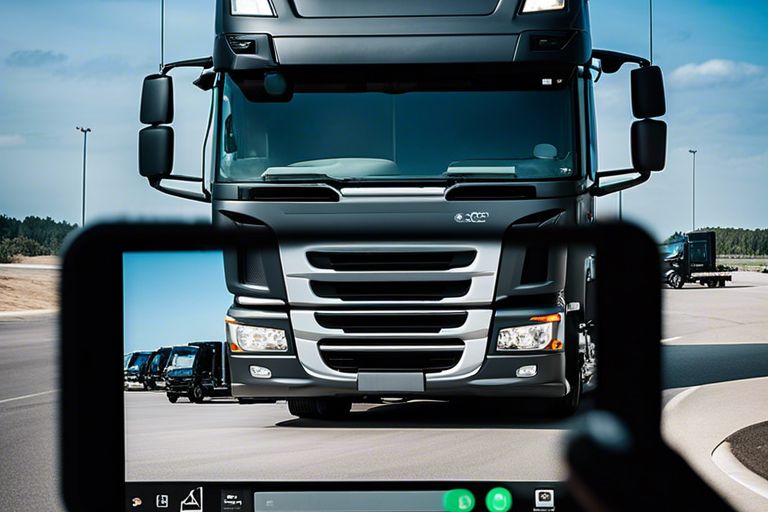Looking to maximize your efficiency and autonomy in the trucking industry? In recent years, the emergence of mobile apps has radically transformed the way trucking dispatch operates, giving you greater control over your schedule, route planning, and communication with dispatchers. These apps have had a profound impact on driver empowerment, offering a wide range of benefits that are revolutionizing the way you work.
With the help of mobile apps, you can now access real-time updates on traffic, weather, and road conditions, allowing you to make informed decisions that can enhance your productivity and safety on the road. Additionally, these apps provide a direct line of communication with dispatchers, enabling you to receive instant updates on load assignments, delivery instructions, and any potential disruptions that may arise. This enhanced communication streamlines the dispatch process, ensuring that you are always in the loop and can make informed choices that positively impact your workday.
Key Takeaways:
- Efficiency: Mobile trucking dispatch apps have significantly increased the efficiency of the driver dispatch process, allowing for quicker and more streamlined communication between drivers and dispatchers. This has helped reduce idle time and increase overall productivity.
- Driver Independence: The use of mobile apps in trucking dispatch has empowered drivers by giving them access to real-time information about their routes, schedules, and load assignments. This has increased their autonomy and ability to make informed decisions on the road.
- Cost savings: The implementation of mobile apps in trucking dispatch has led to cost savings for both trucking companies and drivers. With improved efficiency and reduced downtime, companies have seen a decrease in operational costs, while drivers have benefited from increased earnings due to more efficient routes and better load management.
 1. Improved communication between drivers and dispatchers.
1. Improved communication between drivers and dispatchers.
2. Increased efficiency in dispatch operations.
3. Enhanced visibility into driver location and status.
4. Streamlined load assignments and routing.
5. Reduced paperwork and administrative burden.
6. Increased driver satisfaction and retention.
The Concept of Driver Empowerment
Assuming you are a truck driver constantly on the move, you understand the importance of feeling in control of your job. Empowerment in the context of trucking dispatch refers to the ability of drivers to have a say in their assignments, schedules, and overall work experience. The introduction of mobile apps in the trucking industry has greatly contributed to the concept of driver empowerment by providing drivers with valuable tools and resources right at their fingertips.
Defining Driver Empowerment
Driver empowerment encompasses the idea that you, as a truck driver, have the autonomy and authority to make decisions that directly affect your work. This may include the ability to choose the most efficient routes, have input on load assignments, and manage your schedule in a way that aligns with your personal and professional needs. By empowering drivers, companies can foster a stronger sense of ownership and accountability among their workforce, ultimately leading to improved performance and satisfaction.
Historical Context and Evolution in the Trucking Industry
Over the years, the trucking industry has experienced a significant evolution in terms of technology and operational practices. In the past, dispatching and communication between drivers and fleet managers relied heavily on manual processes, leading to inefficiencies and delays. With the advancement of mobile apps, real-time communication and data access have become integral parts of the trucking industry, enabling drivers to make more informed decisions and navigate the complexities of their work more effectively. This shift has not only improved operational efficiency but has also enhanced the overall work experience for truck drivers, allowing them to feel more empowered and in control of their jobs.
Mobile Dispatch Apps: Features and Functionalities
Unlike traditional methods of trucking dispatch, mobile apps have revolutionized the way drivers and fleet managers operate. These apps are equipped with a range of features and functionalities that streamline the dispatch process, making it more efficient and cost-effective for trucking companies.
Real-Time Tracking and Updates
One of the most valuable features of mobile dispatch apps is the ability to provide real-time tracking and updates. This enables you to have constant visibility into the location and status of your fleet, allowing you to make informed decisions on the go. With real-time updates, you can immediately address any issues or delays, ensuring that your deliveries are on time and your customers are satisfied.
Route Optimization and Traffic Avoidance
Mobile dispatch apps also offer route optimization and traffic avoidance capabilities, which can significantly reduce travel time and fuel costs. By analyzing real-time traffic data and road conditions, these apps can suggest the most efficient routes for your drivers, helping them avoid congestion and delays. This not only improves efficiency but also enhances overall safety by minimizing time spent on the road.
Document Management and Access
Another important feature of mobile dispatch apps is document management and access. These apps allow you to digitally store and access important documents such as bills of lading, invoices, and delivery receipts. This not only eliminates the need for paper-based processes but also ensures that your drivers have immediate access to critical information, improving overall productivity and accuracy.
Communication and Feedback Mechanisms
Effective communication is essential in the trucking industry, and mobile dispatch apps facilitate this through built-in communication and feedback mechanisms. These apps enable seamless communication between drivers and dispatchers, allowing for instant updates and coordination. Additionally, they provide a platform for real-time feedback and performance evaluation, helping you to continuously improve your operations and customer satisfaction.
The Impact on Driver Independence and Decision-Making
Keep your finger on the pulse of your trucking business with the power of mobile apps. With the right tools at your fingertips, you can enhance your control over your schedule, as well as your ability to choose loads and routes more effectively. This level of empowerment leads to better decision-making and ultimately, a more successful trucking operation. For more information on the importance of a truck dispatching app, you can read our blog post Why a Truck Dispatching App is a Must for Your Business.
Enhanced Control Over Schedules
One of the most significant impacts of mobile apps in trucking dispatch is the enhanced control they provide over your schedule. With real-time updates and notifications, you can quickly adapt to changing circumstances and make informed decisions about your route and delivery times. This level of control allows you to optimize your schedule for maximum efficiency, giving you the ability to complete more trips and increase your earnings. With the power of mobile apps, you have the freedom to take charge of your schedule and make the best decisions for your business.
Ability to Choose Loads and Routes
Another key impact of mobile apps in trucking dispatch is the ability to choose loads and routes that work best for you. With access to a wide range of available loads and detailed route information, you can make well-informed decisions that suit your preferences and goals. Whether you prioritize certain types of cargo, specific destinations, or particular time frames, the power is in your hands to choose the loads and routes that align with your strategy. This level of autonomy empowers you to take control of your business and make choices that positively impact your success.

Economic Implications for Truck Drivers
After using mobile apps in trucking dispatch, you will notice several economic implications that directly impact your bottom line. By streamlining the dispatch process and improving efficiency, these apps can significantly impact your earnings and cost savings. To learn more about the impact of dispatching on truckers, you can read the blog post Dispatching for Truckers: The Unsung Heroes of the Road
Earnings and Cost Savings
One of the most significant economic implications of using mobile apps in trucking dispatch is the potential for increased earnings and cost savings. With real-time updates on load assignments, optimized route planning, and reduced paperwork, you can save both time and money. Additionally, by minimizing downtime and empty miles, these apps can help you maximize your earning potential. By leveraging technology to streamline your dispatch process, you can improve your overall efficiency and profitability.
Impact on Job Satisfaction and Retention
Another important economic implication of using mobile apps in trucking dispatch is the impact on your job satisfaction and retention. With improved communication, better visibility into load assignments, and reduced administrative tasks, you can experience a significant improvement in your overall job satisfaction. As a result, this can lead to higher retention rates and increased loyalty to your company. By empowering you with the tools and resources to do your job more effectively, these apps can contribute to a more positive and fulfilling work experience.
Safety and Compliance Benefits
Your mobile app can have a significant impact on safety and compliance within your trucking dispatch. By utilizing the features and capabilities of a mobile app, you can enhance your overall safety and compliance efforts, reducing the risk of accidents and ensuring adherence to regulatory requirements.
Meeting Hours of Service Requirements
One of the key benefits of using a mobile app in trucking dispatch is the ability to easily track and record your hours of service. With real-time monitoring and automated logging, you can avoid violations and fines associated with exceeding mandatory driving limits. This not only keeps you compliant with regulations, but also reduces the risk of driver fatigue, improving overall road safety.
Enhanced Safety Features and Alerts
Another advantage of mobile apps in trucking dispatch is the integration of enhanced safety features and real-time alerts. Your app may include functionalities such as route planning, weather updates, and traffic alerts, providing you with crucial information to make informed decisions and navigate potential hazards. Additionally, some mobile apps offer automated emergency alerts and notifications in case of unforeseen circumstances, ensuring that you are always prepared to handle unexpected situations on the road.
Challenges and Limitations of Mobile Dispatch Technology
For trucking dispatch, mobile apps have revolutionized the industry, offering convenience and flexibility like never before. However, there are certain challenges and limitations that come with relying on mobile dispatch technology. It’s important to understand these potential obstacles in order to effectively navigate them and optimize your dispatch operations.
Connectivity and Reliability Concerns
One of the primary challenges you may face when using mobile dispatch technology is connectivity and reliability concerns. While mobile apps are designed to function seamlessly, they are inherently dependent on a stable internet connection. In areas with poor network coverage, you might experience disruptions in communication, leading to delays and potential errors in dispatch management. Furthermore, relying on mobile devices for real-time updates and communication with drivers can be compromised by network limitations, impacting the overall efficiency of your dispatch operations.
Consider implementing backup communication protocols and exploring alternative solutions to mitigate the impact of connectivity issues. It’s crucial to prioritize reliable network coverage and explore technological advancements that can enhance connectivity for your drivers. Additionally, staying informed about the latest tech tips, such as the “26 Tech Tips to Keep Your Drivers Happy” here, can provide valuable insights into addressing connectivity and reliability concerns.
Training and Usability Issues
Another challenge you might encounter with mobile dispatch technology is training and usability issues. While these apps are designed to streamline your dispatch processes, effectively utilizing their full potential often requires comprehensive training and familiarization. Integrating a new system into your operations can lead to a learning curve for both dispatchers and drivers, impacting the overall efficiency and accuracy of your dispatch management.
To address training and usability issues, prioritize comprehensive onboarding and continuous support for your team. Ensure that your drivers and dispatchers are equipped with the necessary skills and knowledge to effectively utilize the mobile dispatch technology. Additionally, consider gathering feedback from your team to identify areas for improvement and customization, ensuring that the app aligns with your specific operational requirements.
Privacy and Data Security Considerations
Privacy and data security considerations are crucial factors to address when leveraging mobile dispatch technology. With sensitive information and communication being transmitted through these apps, ensuring the protection of data and maintaining privacy is of utmost importance. The potential risks associated with cyber threats and unauthorized access to your dispatch data require vigilant measures to safeguard your operations.
Implement robust security protocols and measures to secure your data and communication channels. Regularly update your mobile dispatch apps and reinforce employee awareness about best practices for data security. By prioritizing the protection of your sensitive information, you can mitigate the risks associated with privacy breaches and enhance the overall security of your dispatch operations.

The Future of Mobile Apps in Trucking Dispatch
Despite the advancements already made in mobile apps for trucking dispatch, the future holds even more potential for improving efficiency and optimizing operations. As technology continues to evolve, so too do the capabilities of mobile apps in the trucking industry. Here are some aspects to consider as you look ahead to the future of trucking dispatch.
Technological Advancements and Integration
As technology continues to advance, you can expect to see even more integration of mobile apps with other systems and devices. This could include seamless connectivity with onboard vehicle systems, real-time data sharing, and integration with other software solutions used in the transportation industry. With the use of artificial intelligence, machine learning, and automation, the potential for more efficient and effective dispatch operations is limitless. You may find that tasks such as load matching, route optimization, and predictive maintenance become even more streamlined and accurate with the integration of advanced technologies.
Potential Regulatory Changes and Their Impact
In the future, you should also keep an eye on potential regulatory changes that could impact the use of mobile apps in trucking dispatch. This may include new requirements for electronic logging devices, data privacy and security regulations, or changes in compliance standards. Staying ahead of these regulatory changes and ensuring that the mobile apps you use are compliant will be crucial in avoiding disruptions to your operations. While these changes may present challenges, they also open up opportunities for the development of more robust and adaptable mobile app solutions tailored to meet new regulatory requirements.
The Role of Big Data and Analytics
Big data and analytics will continue to play a significant role in the future of mobile apps in trucking dispatch. This includes the ability to collect and analyze vast amounts of data from various sources, providing insight into areas such as driver performance, fuel efficiency, load tracking, and maintenance forecasting. By leveraging advanced analytics and predictive modeling, you can gain a deeper understanding of your operations and make more informed decisions. This can lead to improved efficiency, cost savings, and a more competitive edge in the industry.
Driver Empowerment – The Impact of Mobile Apps in Trucking Dispatch
Ultimately, the use of mobile apps in trucking dispatch has significantly empowered you as a driver. These apps have helped streamline communication, reduce paperwork, and improve overall efficiency in your daily operations. With real-time updates and instant access to important information, you have been able to make more informed decisions and better manage your time on the road. As a result, your job has become more convenient and flexible, allowing you to focus on driving and delivering goods while staying connected and informed.
Overall, mobile apps have revolutionized the trucking industry and have given you greater control over your work. By harnessing the power of technology, you have been able to enhance your productivity and effectiveness as a driver. As the professional behind the wheel, you have been empowered to take charge of your dispatch operations and navigate the road with confidence and efficiency.
FAQ
Q: What is driver empowerment in the context of trucking dispatch?
A: Driver empowerment refers to the use of mobile apps to give truck drivers more control and visibility over their work, including load assignments, navigation, and communication with dispatch.
Q: How do mobile apps impact trucking dispatch?
A: Mobile apps streamline the process of dispatching by allowing for real-time communication, load tracking, and efficient route planning, leading to more efficient operations and increased driver satisfaction.
Q: What are the benefits of driver empowerment through mobile apps?
A: The benefits include improved driver retention, increased productivity, reduced idle time, better customer service, and overall cost savings through optimized operations.
Q: Do mobile apps replace traditional dispatch methods?
A: While mobile apps enhance the dispatch process, they do not necessarily replace traditional methods. Rather, they supplement and improve existing systems, leading to more efficient and effective operations.
Q: Are there any downsides to driver empowerment through mobile apps?
A: Some challenges include the need for driver training on app usage, potential security concerns related to data transmission, and the integration of app data with existing dispatch systems.
Q: How can trucking companies implement driver empowerment through mobile apps?
A: Companies can implement driver empowerment by selecting and deploying user-friendly, feature-rich mobile apps, providing training and support to drivers, and integrating the app data with existing dispatch and tracking systems.
Q: What does the future hold for driver empowerment and mobile apps in trucking dispatch?
A: The future is expected to bring continued innovation in mobile app technology, including more sophisticated features for load tracking, communication, and compliance management, further enhancing driver empowerment and overall operational efficiency.
Pingback: Top 5 Gantry Crane Manufacturers: A Comprehensive Guide for Industrial Needs